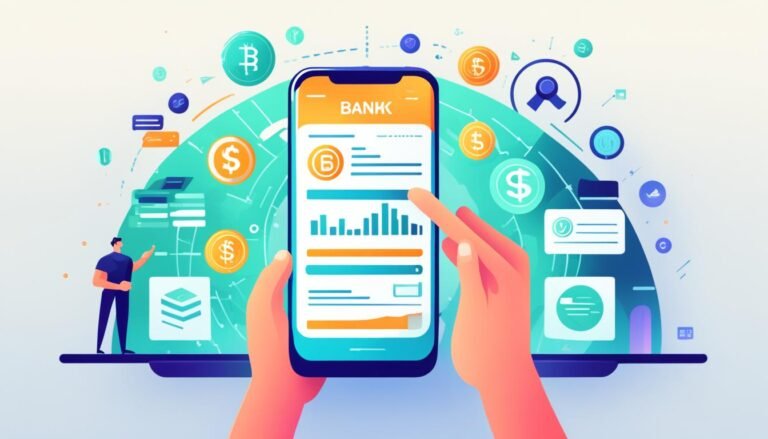Blockchain in Finance: Is This the End of Banks As We Know Them?
It’s hard to believe, but 90% of banks in Europe and North America are looking into blockchain. This huge interest suggests that banks might completely change soon. With blockchain, the way we think about banking could be turned upside down. This technology is known for its safety and clear record-keeping. It might make current banking systems outdated.
Blockchain technology has the power to really shake things up in finance. It challenges the current banking system. Banks need to evolve or they might become unnecessary. This is because blockchain offers better security and direct ways to send money without middlemen. Could this be the start of a major shift in how we handle money and business?
Key Takeaways
- Blockchain’s widespread adoption in finance signals a major industry transformation.
- Enhanced security and transparency are setting new standards in financial transactions.
- The possibility of decentralized banking threatens to usurp traditional banking models.
- Blockchain in finance could result in greater efficiency by removing intermediaries.
- Financial institutions are facing an adapt-or-perish scenario due to potential financial industry disruption.
- The future of blockchain in finance promises a reimagined ecosystem for transactions, lending, and asset management.
The Transformative Power of Blockchain in Financial Services
Blockchain technology is changing financial services in big ways. It promises better financial security, more efficiency, and new banking structures. With each update, blockchain could impact anyone, from individuals to big banks.
Enhancing Security and Reducing Fraud
Blockchain is a powerful tool against security risks and fraud. Its design as a decentralized ledger helps catch fraud by recording every transaction. So, financial firms are using blockchain to create safe spaces. This transparency helps fight fraud.
Streamlining Costs and Operations
Blockchain can help cut costs and make operations smoother in finance. By removing middlemen, costs for people and banks could drop. It also avoids manual errors, thanks to its precise and efficient processes.
Decentralizing Traditional Banking Models
Blockchain is making decentralized banking more possible. It moves us away from old, central banks towards a fairer system. This change could help people with less access to banks by giving them new tools to manage their money.
| Feature | Traditional Banking | Blockchain-Enabled Banking |
|---|---|---|
| Data Transparency | Limited to internal systems | Universal across the entire network |
| Operational Cost | Higher due to intermediaries | Lowered by smart contracts |
| Security Risk | Higher susceptibility to fraud | Improved by immutable ledgers |
| Financial Inclusion | Constrained by geography and status | Enhanced through decentralized access |
Blockchain in Finance
The rise of blockchain technology has changed the finance industry. It’s more than a new tool; it’s a total makeover. Across the world, disruption changes how sectors work. Blockchain is at the forefront, reshaping finances.
Blockchain is a secure ledger that can’t be changed easily. Each ‘block’ records transactions. When a new transaction happens, everyone’s record gets updated. This keeps the transaction history accurate and makes everything more transparent.
Blockchain builds trust by making transactions verifiable. In finance, this means safer transactions start to finish. Blockchain also brings needed automation and innovation. These are key for digital success.
- Enhanced Security: Blockchain’s design prevents tampering, protecting against cyber threats. It keeps the finance world safe.
- Operational Efficiency: Blockchain cuts out waste, speeds up processes, and reduces the need for middlemen. This makes finance operations smoother.
- Decentralization of Assets: Without central control, blockchain supports fairer finance models. It opens the door to decentralized finance (DeFi).
Blockchain isn’t just for cryptocurrencies. It’s also for asset tokens, smart contracts, and decentralized apps. These shake up traditional banking. The finance industry’s shift towards these innovations shows big changes are happening.
Blockchain’s theoretical potential is now real progress. It’s changing how we deal with money at every level. This signals a huge shift in financial transactions and services.
“Blockchain technology carries the potential to introduce unprecedented levels of efficiency, transparency, and innovation across all financial services.”
Blockchain’s effect on finance is clear. The industry’s makeover is in full swing, with blockchain leading to a safer, more efficient, and open future.
Adapting to Blockchain: A New Era for Financial Institutions
The finance world is changing fast, thanks to blockchain technology. Financial institutions are finding themselves at a crossroads. They need to change their ways because of decentralized finance (DeFi). This change highlights the need for innovation and puts the power in the users’ hands.
Embracing Decentralized Finance (DeFi)
DeFi shows how blockchain can change finance for the better. It makes financial services in ways that don’t rely on traditional banks. DeFi leads to a financial system that’s open to everyone, focusing on accessibility and inclusion. Banks are now looking to mix DeFi into what they offer. They want to stay ahead in this new environment.
Banking on Blockchain – Innovative Services
Blockchain is sparking new financial services. It allows for smart contracts that run on their own and helps people invest in real assets easily. This pushes old-school banks to update their services. They see the value in blockchain for making more money and working more efficiently.
Impact on Employment and Skill Sets in Finance
Blockchain is changing jobs in finance too. Banks preparing for blockchain need people who know finance and blockchain tech. This move to a decentralized system is creating new jobs. It requires skills in blockchain, cyber-security, and managing digital assets. This is making the finance industry more innovative and tech-savvy.
The Economic Impacts of Digital Currencies and Assets
Digital currencies and assets are shaping a new era in finance. Thanks to blockchain technology, the way we view value is changing. They are affecting markets and opening new investment possibilities beyond just money exchanges.
Market Reactivity and New Investment Paradigms
These digital currencies make markets react in ways we haven’t seen before. Their prices can go up and down quickly, impacting the whole financial scene. This has led investors to adopt new strategies that are flexible and quick.
Digital Assets and the Emergence of New Markets
Digital assets are creating entirely new markets. They offer various investment chances from cryptocurrencies to blockchain-based innovations. These options allow investors to explore different ways to manage their assets in today’s digital world.
As digital assets grow, they will blend more with traditional finance. This blend brings challenges but also opportunities for markets to adapt and improve. They force the financial world to be more dynamic and innovative.
Blockchain’s Role in Capital Market Evolution
Blockchain technology is changing capital markets in big ways. It makes the process of doing financial transactions better by cutting down the steps and removing the middlemen. Thanks to blockchain adoption, transactions are faster, cheaper, and clearer.
Tokenization is a key use of blockchain in these markets. It digitally represents real assets on a blockchain, making them easier to buy, sell, and own a part of. This opens up the market to more people, making assets that were hard to split or sell now accessible to many.
- Decentralization of financial markets
- Increased access to global investment opportunities
- Reduction in settlement times and counterparty risk
“Blockchain technology holds the promise of introducing greater transparency and efficiency to the heart of finance,” says the World Economic Forum. It’s much more than just about banking and payments.
Even with its benefits, fully adopting blockchain in capital markets is hard. We need clear laws and need to solve issues like cybersecurity, scalability, and how well different systems can work together. Also, people and technology must be ready to use this new method.
Capital markets will likely change as blockchain becomes more common. This is because of their never-ending search for better market efficiency and the trust blockchain brings. The ability to tokenize assets is especially exciting. This could make today’s slow, hidden financial dealings a thing of the past.
For blockchain to reach its full potential, those in the market and regulators need to work together. They can create a space that sparks new ideas while keeping everyone’s interests safe. This will help everyone in capital markets grow.
Asset Management and the Blockchain Revolution
The blockchain revolution is changing asset management. It brings more transparency and efficiency. This new tech sets higher standards for fund management and cap table management.
Companies globally see its big impact. Blockchain allows real-time transaction records and clear ownership checks.
Advances in Fund Management
Blockchain greatly changes fund management. It offers more openness and smoother processes. Putting assets on blockchain boosts liquidity, making investments easier to access.
This tech also supports clear and regular updates. It helps keep investor trust high and meets regulatory needs.
Revamping the Cap Table Management
Cap table management is getting simpler thanks to blockchain. It makes keeping track of shareholders and managing equity easier throughout a company’s life. Real-time updates and clear ownership records are now possible.
This reduces mistakes and makes transactions faster. It brings more transparency and ease to managing ownership structures. Blockchain is leading the way to a future of clear and simple cap table management.
Disrupting Payment Systems: Blockchain’s Cost-Effective Solutions
In this digital age, blockchain technology is key, especially in payment systems. It offers cost-effective solutions for many problems in financial transactions. This includes issues like transaction security. Both businesses and individuals are turning to blockchain to make their financial dealings smoother and cheaper.
Blockchain is set to change how we handle payments by eliminating middlemen like banks. This reduces costs and streamlines transactions. With blockchain, direct peer-to-peer transactions become easy, cutting down on fees and boosting efficiency. This change is huge for cross-border payments, which are usually expensive and slow.
What really stands out about blockchain is its transaction security. It runs on a consensus system, making each transaction clear and permanent. This nearly removes the risk of fraud and tampering. So, blockchain provides a very safe platform for online financial exchanges.
- Direct peer-to-peer transactions
- Consensus-based security
- Cost reductions through disintermediation
Traditional financial players need to rethink their place in this new world. Blockchain’s cost-effective solutions mean they have to adapt or fall behind. They must take up this technology to stay relevant in a fast-evolving financial scene.
“Blockchain’s intrinsic security and lower transaction costs are propelling an overhaul of the financial transaction ecosystem, setting a new standard for payment systems.”
Looking ahead, more and more financial groups will embrace blockchain payments. Their ability to lower costs and heighten transaction security places blockchain at the heart of financial industry reform.
Banking and Lending Transformed by Blockchain Technology
Banking and lending are evolving thanks to blockchain technology. This big change means better efficiency, security, and clearness for financial services. Using distributed ledgers, banks can improve how they handle loans and update mortgage systems.
Lending Processes Re-imagined
Lending is getting a makeover with blockchain. This technology makes borrowing and lending smoother for everyone. Here are some benefits:
- Less paperwork and fewer steps needed, which speeds up processes.
- Better tracking of loans, making the process open for all to see.
- Using smart contracts for automatic credit checks and underwriting, saving money and lowering risks.
This means lending will be faster and open to more people and companies.
Mortgage and Loan Systems Powered by Blockchain
Blockchain could greatly simplify mortgage systems that are currently complex. Here are the advantages:
- Documents can’t be changed once they’re recorded, which fights fraud.
- Quick checks of ownership and liens, making closure faster.
- Using distributed ledgers for syndicated loans, spreading out risk and adding liquidity.
With blockchain, mortgage processes will be simpler and more reliable.
| Feature | Traditional Systems | Blockchain-Powered Systems |
|---|---|---|
| Processing Time | Weeks to months | Hours to days |
| Transparency | Low – Moderate | High |
| Security | Vulnerable to fraud | High resistance to tampering |
| Access to Services | Limited by geography and bureaucracy | Global and decentralized |
In conclusion, the combo of blockchain technology and finance is promising. It will change how we manage loans and mortgages. This new technology will create a stronger, fairer, and more energetic banking world.
Conclusion
We’ve looked deep into blockchain in finance and seen big changes ahead. The old ways banks worked are being challenged. Technological disruption is shaking things up, thanks to blockchain. This isn’t just about doing things faster or safer. It’s about making finance fairer and more open to everyone.
The future of banking hangs on adapting to new tech like blockchain. Some smart banks are getting on board. They’re using blockchain for different things, like moving money, keeping track of assets, and updating old systems. This move is key to staying relevant in a rapidly changing world. Being quick to change and innovate is now a must for any bank.
Ending our look at blockchain, we see it’s a mix of big promise and big challenges. It opens up exciting chances to make banking better and more inclusive. But, facing the hurdles it brings is no small task. The path forward will be tough but rewarding. It’s about reshaping a basic part of our world to fit the digital age.







